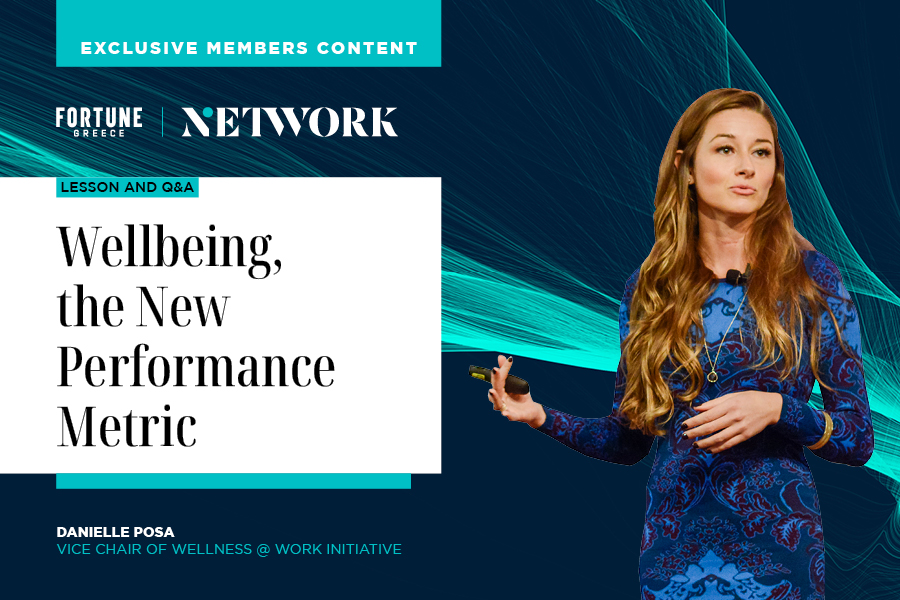Danielle Posa: Wellbeing is the new performance metric
- 19/02/2022, 09:00
- SHARE

Very often, lately, we have been hearing a lot about the well-being (or wellness) of employees in a company. For most people, this parameter is simply something that is ‘good to have’ and is not considered important in all cases. In their attempt to achieve their targets, many companies simply did not care about the well-being of their employees up to now.
“When people hear the term ‘wellbeing’, especially in the context of organizations, you might first think of it as something that is just the soft stuff. Wellbeing or wellbeing programs are nice to have, but they’re not necessarily a priority. You also might just think of it as a program or a perk or a benefit”, noted Danielle Posa in her presentation titled “Wellbeing: The New Performance Metric” to the members of Fortune Greece Network.
With more than 13 years of experience in employee engagement, wellbeing, leadership development, and business consulting, Danielle is a sought-after workplace wellbeing advisor to companies of all sizes, helping them design long-term wellbeing strategies. She is also the Vice-Chair of the Global Wellness Institute’s Workplace Wellbeing Initiative.
Danielle started her career as a management consultant at Gallup, and while she was there, she was assigned to Deepak Chopra – whom we all know of – as a liaison for Gallup’s Global Wellbeing research. After leaving Gallup, she started her own consulting and training business, and she and Deepak developed a unique leadership course called “The Workplace Wellbeing and The Soul of Leadership”. After that she became the Director of Enterprise Solutions for Deepak’s parent company, Chopra Global, where she led the B2B wellbeing strategy, product development and execution.
“A real wellbeing strategy is infiltrated into culture. I want you to think of it as absolutely crucial to your business, not just a nice to have, but a need to have. And also think of it as your key performance metric” she stressed while addressing the members of Fortune Greece Network, referring to the definition of wellbeing and Gallup’s detailed research on the matter. In fact, as she explained, “when we hear wellbeing, a lot of other terms get kind of thrown into this category. Mindfulness as part of wellbeing, happiness as part of wellbeing, health and fitness as part of wellbeing, and so is wellness and mental health. So, you might wonder what the difference is between all of these. The difference is that when we talk about wellbeing, it really has to do with the overall quality of life of your employees. All of these other terms are really parts of wellbeing. So, mindfulness is more of a practice. You see the person meditating. It’s more of a practice of meditation and a way of thinking”.
Daniel Posa analysed further the findings of Gallup’s research titled “Wellbeing: The Five Essential Elements”, concluding that work is the most important element of one’s life in terms of what is influencing their wellbeing. “And the reason why work is the most important for your wellbeing is because your work gives you a sense of your identity. It’s where you make your money to feed you and your family. It’s the place where you have an opportunity to learn and grow as a human being. A lot of our social networks are tied to our work, and it’s also where we spend the majority of our time. So, getting that, really focusing on work and workplace as a way to improve wellbeing, that’s one of the reasons why it’s so important”.
Addressing executives and those individuals in charge of leading a company, Danielle asked them to consider the following: “So, a thriving employee is not just an employee who is well. It’s not just a healthy employee or a fit employee. A thriving employee really is an empowered employee. And when an employee is empowered, they contribute all kinds of things to your business. And this is where my wellbeing is really synonymous with performance”.
While analyzing the business case for wellbeing, Danielle Posa highlighted the impact of the pandemic and the phenomenon of the Great Resignation, particularly observed in the US. She noted that “several companies can’t seem to keep their talent. And a huge reason for that is because people are putting their foot down when it comes to wellbeing and their sense of work-life balance”. She added that, according to a recent survey with the participation of almost 3,000 individuals, employees with high engagement, who are engaged in their work, enjoy their work and have high wellbeing are 59% less likely to look for a job within a different organization in the next twelve months.
“Training managers is a crucial part of a wellbeing strategy because managers are really the glue to making sure that people are doing okay. Managers have their finger on the pulse of their employees, or they should. And so, making sure that managers understand how can they engage their employees or how can they properly check in with their employees is really important” concluded Danielle Posa, who asked business executives to hire specialists who can draft an appropriate and effective wellbeing strategy and not try to pass this to HR departments. Business leaders should always prioritize their own wellbeing because, by doing so, they show other people in the company that they are truly committed to this goal.
